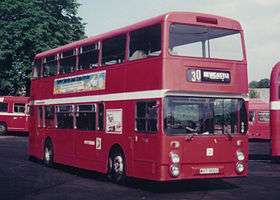Foden NC
The Foden NC was an unsuccessful design of double-decker bus chassis built by Foden of Sandbach and Northern Counties of Wigan in the United Kingdom between 1975 and 1978.
| Foden NC | |
|---|---|
 Potteries Motor Transport bodied Northern Counties bodied Foden NC | |
| Overview | |
| Manufacturer | Edwin Foden, Sons & Co. |
| Assembly | Foden, Sandbach |
| Body and chassis | |
| Doors | 1 or 2 |
| Floor type | Step entrance |
| Chassis | Steel ladder frame |
| Powertrain | |
| Engine | Gardner 6LXB |
| Capacity | Up to 76 Seats |
| Power output | 184bhp |
| Transmission | Allison MT640 Torque converter |
| Dimensions | |
| Length | 9.5 m (370 in) |
| Width | 2.5 m (98 in) |
| Height | 4.1 m (160 in) to 4.4 m (170 in) |
| Curb weight | Around 10 tonnes unladen |
| Chronology | |
Background
Foden was primarily a truck manufacturer, although it had also built bus chassis in the past, whilst Northern Counties was a bus body manufacturer, building bodywork onto chassis produced by other companies. At the time of the design's conception, British Leyland had by far the largest share of the market for double-decker buses in the UK, with its Atlantean, Fleetline and Bristol VR models. The Foden NC was intended to compete against these for a share of this market.[1][2][3]
Design
The Foden-NC was a semi-integral design, meaning that it has an underframe (chassis), but that the bodywork is also structurally load-bearing.
The transmission proved to be a weakness, with the Foden transfer box being prone to failures and the Allison gearbox inefficient. Derby City Transport refitted its Foden NC with Voith transmission in an attempt to overcome the problems.
In appearance, the Northern Counties bodywork was very similar to the style built on other chassis.
Production
Only seven vehicles were completed, one of which carried bodywork built by East Lancs instead of Northern Counties. An eighth, partially completed, bus was used for testing.
The vehicles went to the following operators:[4]
- Greater Manchester PTE: two, registered LNA 258P & PNE 358R, numbered 1435 & 1436
- West Yorkshire Passenger Transport Executive: one, registered TUB 250R, numbered 7250
- West Midlands Passenger Transport Executive: one, registered ROC 300R, numbered 6300
- South Yorkshire Passenger Transport Executive: one (with East Lancs body), registered SWG 311S, numbered 511
- Derby City Transport: one, registered WTO 101S, numbered 101
- Potteries Motor Traction: one, registered WVT 900S, numbered 900
Most of the vehicles experienced shorter than average working lives, although two of them (TUB 250R and ROC 300R) still exist, preserved in the care of Aintree Coachlines of Liverpool.[5]
References
- Foden bus for Manchester PTE Commercial Motor 21 November 1975
- Foden presses on with seven orders Commercial Motor 9 April 1976
- The Experimental Northern Counties Bodied Fodens SELNEC Preservation Society
- Foden NC Bus Lists on the Web
- "Aintree Coachline fleet list (unofficial) – 7 April 2010". Archived from the original on 9 May 2008. Retrieved 10 November 2010.
- Booth, Gavin and Brown, Stewart J. (1984) The Bus Book : Ian Allan Ltd., ISBN 0-7110-1440-X
- Bus Lists On The Web